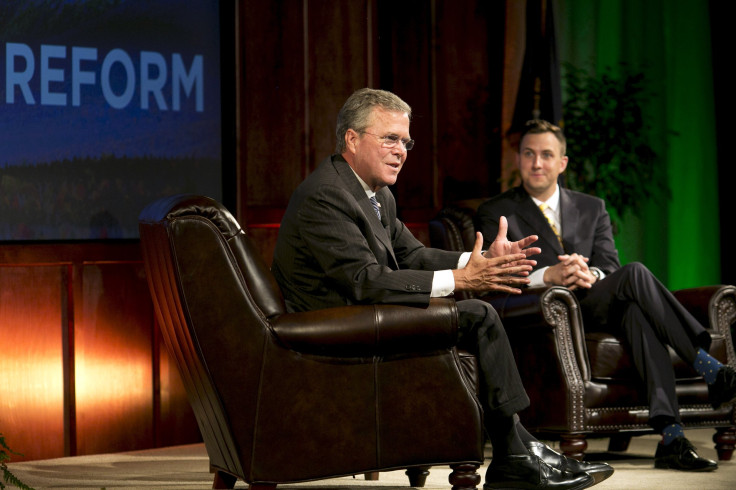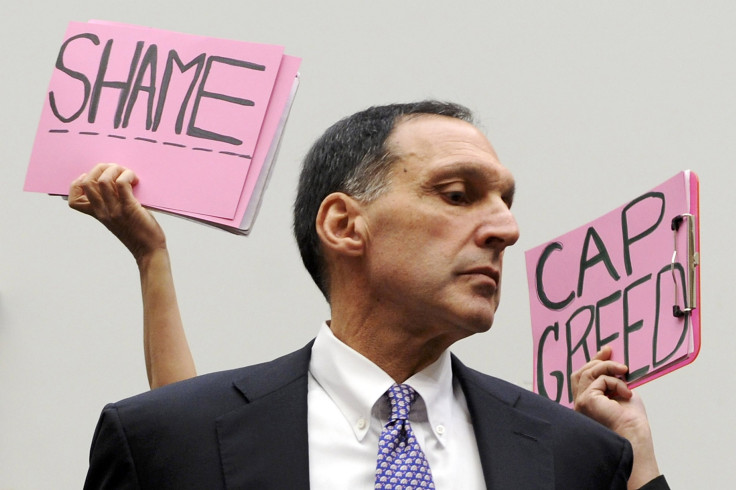Election 2016: Jeb Bush Got $1.3M Job At Lehman After Florida Shifted Pension Cash To Bank

For Florida taxpayers, the move by the administration of then-Gov. Jeb Bush to forge a relationship with Lehman Brothers would ultimately prove disastrous. Transactions in 2005 and 2006 put the Wall Street investment bank in charge of some $250 million worth of pension funds for Florida cops, teachers and firefighters. Lehman would capture more than $5 million in fees on these deals, while gaining additional contracts to manage another $1.2 billion of Florida's money. Then, in the fall of 2008, Lehman collapsed into bankruptcy, leaving Florida facing up to $1 billion in losses.
But for Jeb Bush personally, his enduring relationship with Lehman would prove lucrative. In 2007, just as he left office, Bush secured a job as a Lehman consultant for $1.3 million a year, Bloomberg reported.
Weeks after Bush took the Lehman job, the Florida State Board of Administration (SBA) -- a three-member body that makes investment decisions about state pension funds and whose ranks had recently included one Jeb Bush -- gave Lehman additional business: SBA purchased $842 million worth of separate investments in Lehman’s mortgage-backed securities. Over the course of one year from June 2007 to June 2008, the SBA would shift an additional $420 million of pension money into the same fund in which the state had begun investing under Bush.
In short, during Bush’s first year working for Lehman, his former colleagues in Tallahassee, the state capital, moved vast sums of Florida pension money into the doomed Wall Street investment bank, even as warnings about its financial troubles began to emerge.
Bush left Lehman Brothers after the firm declared bankruptcy in 2008. He joined British banking giant Barclays as an adviser soon thereafter and held that title until late 2014, when he closed out his business interests in preparation for a presidential run.
These days, Jeb Bush is actively seeking the Republican nomination for president, and in so doing, he presents himself as a champion of the public interest in the face of a corrupted system exploited by insiders who enrich themselves at taxpayer expense. But an International Business Times investigation of Bush’s role in helping steer state investment to Lehman and his subsequent employment with the firm challenges that depiction, raising the prospect that Bush may have personally profited from choices his administration made that benefited the bank.
Bush’s presidential campaign declined to answer IBTimes questions about state investments that Lehman made while he was governor and soon afterward, while he was working for the bank. He has denied having anything to do with the 2007 transactions, according to a Tampa Bay Times review of the state’s investments in Lehman after Bush left office.
Former government officials and ethics experts interviewed by IBTimes say the sequence of transactions raises significant questions.
"This is a breathtaking conflict of interest going on here,” said Craig Holman, governmental ethics lobbyist with Public Citizen, a good-government group. “This cost Florida very dearly, and it enriched Jeb Bush."
Jeff Connaughton, author of the book “The Payoff: Why Wall Street Always Wins,” said the transactions illustrate a larger culture that dominates the politics of finance.
“The Bush family is so wired that Jeb Bush would be incredibly valuable to Lehman even without him having thrown some business their direction,” said Connaughton, the former chief of staff to U.S. Sen. Ted Kaufman, a Democrat who served on the panel that investigated financial fraud after the bank crisis of 2008. “The fact that he did shows once again that there is utterly zero deterrence preventing public officials from being on the receiving end of pay to play when they leave office. It’s par for the course -- it has the appearance that Bush was using his public office for personal gain.”

Florida originally began investing money in Lehman in 2005, while Bush was the highest profile member of the SBA, which oversees the $150 billion pension fund. The Bush-led SBA that year committed $176 million to Lehman; in 2006, as Florida moved another $87 million into the Lehman investment, the firm hired Jeb Bush’s cousin, George Herbert Walker, to run the firm’s investment management division.
The next year, Lehman offered the outgoing Florida governor the consulting job. Bush had worked briefly at a Texas-based bank after college, but he lacked significant Wall Street experience.
Most of the investment losses that hit Florida starting in July 2007 were tied to the Lehman mortgage-backed securities bought the year Bush began his employment at the firm.
“The policy question that this kind of situation raises is whether the public can have confidence that the decision to send business to Lehman was affected in any way by the prospects of what might happen after Bush left the government,” said Kathleen Clark, a leading ethics expert and law professor at Washington University St. Louis. “The question is whether the public interest is safeguarded or is, instead, at risk because public officials may be making decisions with a view towards ingratiating themselves to future clients and employers,” she said.
Other areas of Bush’s post-government employment and his management of the state pension system have previously provoked scrutiny. Bush approved a land deal in Florida benefiting a timber company, Rayonier, that later paid him $1 million after he left office, as IBTimes reported in June. IBTimes also reported that under Bush, Florida shifted billions of dollars of pension cash to financial firms whose executives had raised large sums for his brother’s presidential campaign. Some of those same donors are now giving money to the super PAC supporting Jeb Bush’s 2016 presidential bid.
In many states, governors have a modicum of distance and plausible deniability from pension policy because they have limited connections to the officials who oversee specific investment decisions. That was not the case when Florida invested in Lehman in 2005 and 2007. The fund’s executive director in both cases was Coleman Stipanovich, the brother of a Bush campaign aide who became one of the most powerful lobbyists in the state. The SBA appointed Stipanovich to his position in September 2002, while Bush was on the SBA board. And though Stipanovich has said Bush did not involve himself in specific pension investment decisions, emails reviewed by IBTimes show that Bush periodically consulted with Stipanovich on prospective state investments.
As Florida cemented its relationship with Lehman, troubling signs about the bank’s stability were intensifying.
In a 2011 study, Canadian business school professors Danielle Marin and Julien Le Maux found that Lehman’s publicly available financial statements -- easily accessible to Bush and the investment staff -- contained clear warnings about Lehman’s precarious condition during Florida’s initial and subsequent investments in Lehman.
The “signs of financial distress were detectable” beginning in 2005, their report concluded. The signs included a “chronic inability to generate cash from operating activities,” taking on too much risk in untested financial products like derivatives, issuing bonds for itself to mask its operating deficits, and a “steady deterioration of the cash situation over three consecutive years.”
© Copyright IBTimes 2024. All rights reserved.





















